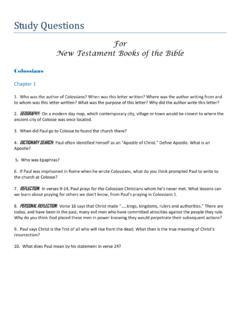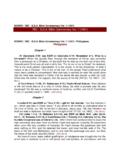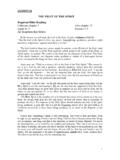Transcription of forgiveness in the new testament - Contemporary Christianity
1 forgiveness in the new testamentjanet unsworth1| forgiveness3 forgiveness in the new testamentintroducing the seriesThis paper is the third in a series of 15 papers to be produced over a twoyear period as part of the Embodying forgiveness project run by the Centrefor Contemporary Christianity in Ireland (CCCI). Drawing on a broad rangeof contributors, from a broad range of backgrounds, the papers aim to ex-plore the meaning of forgiveness in the Bible and in different Christian tradi-tions, and to ask about the implications of the practice of forgiveness for oursociety. It is worth saying at the outset that we have not insisted on a par-ticular definition or understanding of forgiveness among those who will becontributing to the series.
2 Rather, our hope is that through this series ofpapers we will come to a fuller and more authentic understanding of forgive-ness and its implications for church and : 2001forgiveness3 forgiveness in the new testament | 2introductionIn recent years there has been a developing debate around the subject offorgiveness across a wide range of academic disciplines. As part of this,there has been an increased interest in the theology of , reflection on biblical material relevant to the subject has beenlargely absent. This paper aims to explore perspectives on forgivenessfrom the New testament , with a particular focus on Jesus' teaching in testament wordsIt is important to note that the verb usually used in the New testament forthe act of forgiving is the same verb used to describe the remittance of adebt (aphielami).
3 1 Moreover, in Greek linguistics and culture often thesame noun is used for debt and sin (opheilama). Thus, the concepts ofdebt and sin appear to be interchangeable, as are the concepts of forgiv-ing sin and remitting debt. This implies that the relationship between Godand humanity is analogous to that between a creditor and a , while this forgiveness involves release or remission it does notsignify dissolution of the relationship with God. Rather, forgivenessrestores the relationship between God and His from john to revelationMost of the references to forgiveness in the New testament are found inthe gospels of Matthew, Mark and Luke. However, there are a number ofother references scattered throughout the rest of the New the writings of John there are three references.
4 In 1 John the believersare told that their sins have been forgiven on account of Jesus' name(2:12) and that, if they confess their sins, they will be forgiven (1:9). Inboth instances it is God's forgiveness of human beings that is in view. Theother reference in John's writings is found in his gospel (20:23). While thetraditional Protestant interpretation of this passage stresses the church'sproclamation of God's forgiveness and the traditional Catholic interpreta-tion stresses the church's authority to administer that forgiveness , bothinterpretations understand the passage to refer to divine forgiveness ofhuman book of Acts contains six references to forgiveness .
5 All of these occurin the context of proclamation and witness, and referring to God'sforgiveness of sinners (2:38; 5:31; 8:22; 10:43; 13:38; 26:18). In thesepassages forgiveness is variously linked with repentance, baptism,believing, justification and enlightenment. However, there is no commonpattern and not all these elements are present on every occasion. One ofthe core elements, repentance, is presented as both a command thatmakes forgiveness possible (2:38) and a gift that is given with forgiveness (5:31).While the writings of Paul contain no extended treatment of forgiveness ,there are a number of important references. Romans has one referencecontained in a quotation (4:7).
6 2 Corinthians has three references: tworefer to forgiveness among Christians (2:7, 10), while the third is purelyrhetorical (12:13). Particularly significant are the references in Ephesiansand Colossians where Paul focuses on the relationship between Christ,divine forgiveness and forgiveness in the Christian community (Ephesians1:7; 4:32; Colossians 1:14; 2:13; 3:13).In the first chapter of Ephesians the reference to forgiveness (v7) occursin the context of a hymn celebrating God's grace in Christ, which reaches3| forgiveness3 forgiveness in the new testamentback before time and forward into the eschatological future. As Paulelaborates the benefits that believers have in Christ he makes mention of"redemption through his blood, the forgiveness of sins.
7 " Their redemptionis their liberation, which is made possible through the death of Christ andexperienced through Ephesians 4 the reference to forgiveness (v32) occurs in the context ofa passage concerning the nature of the believers life together as churchand looks back to the message of chapter 1, in that it holds up the forgive-ness that the believers have received in Christ as the model for theforgiveness they are to exercise in relation to one another. In their exer-cise of forgiveness in the church they are to be imitators of God (5:1).Colossians conveys a very similar message. The first chapter recountsthe glory of Christ, the wonders of grace and the comprehensiveness ofsalvation - including "redemption, the forgiveness of sins" (1:14).
8 In thesecond chapter forgiveness is mentioned again in the context of anextended passage describing the scope of Christ's accomplishments onthe cross where "he forgave us all our sins" (2:13). As in Ephesians, Paulthen holds up the forgiveness of Christ as a paradigm for the practice offorgiveness among believers as they work out the implications of thegospel for their life together. In chapter 3 he identifies both vices to beavoided and virtues to be pursued. Among the latter, Paul encourages theColossian believers to "bear with each other, and forgive whatevergrievances you may have against one another. Forgive as the Lordforgave you." (3:13).
9 For Paul, then, the Christian virtue of forgiveness should be a normativeaspect of relationships among believers. This forgiveness is rooted in theforgiveness that believers have experienced in Christ; forgiveness that is,for its part, only one aspect of the more comprehensive mystery of God' book of Hebrews has three references: the first is a quotation fromthe Old testament (8:12), the other two refer to divine forgiveness in thecontext of the writer s discussion of the relationship between Christ andthe sacrificial system (9:22; 10:18). Finally, James has one reference toforgiveness by God in the context of sickness and healing (5:15).Taken together, a number of points are relevant.
10 First, almost all thereferences to forgiveness are references to God's forgiveness of rest are largely concerned with the practice of mutual forgivenessamong believers. There are no clear references to forgiveness of thoseoutside the community of believers by believers, nor to the practice offorgiveness outside the , there is little discussion of the need for certain events to takeplace in a certain order for forgiveness to be possible: specifically, theNew testament writers do not attempt to explain the relationship betweenrepentance and forgiveness . As we have seen, this relationship is onlyaddressed directly in the book of Acts and even then it is not presented inany systematic way.







